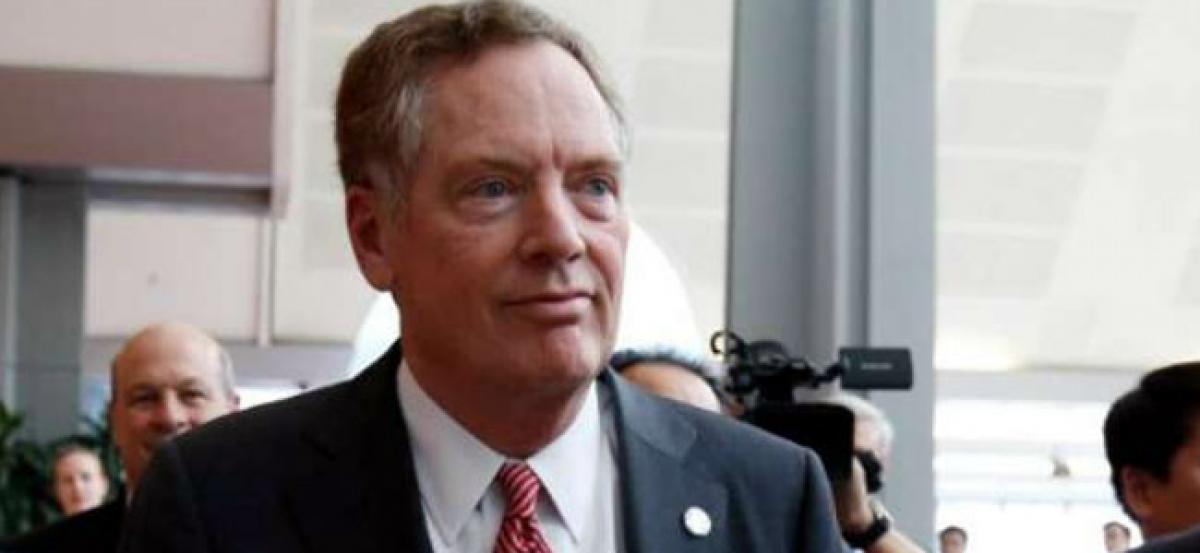Live
- PKL 11: 'No one can predict who will reach the playoffs,’ says UP Yoddhas coach
- Nobody praises Kejriwal's ten-year tenure: Sandeep Dikshit
- MacBook Air M3 Hits Lowest Price in India: Find Details
- High Court Adjourns Hearing on Allu Arjun's Petition to 4 PM
- Pawan Kalyan praises Chandrababu Naidu at Swarnandhra Vision 2047 document launch
- Chirec International looks to transform education with Chirec 2.0 vision
- Telangana CM Revanth Reddy Responds to Allu Arjun's Arrest in Delhi
- Uddhav Thackeray to PM Modi: Pay attention to Bangladesh, act to end Hindus’ misery
- Allu Arjun Arrested: KTR Reacts on X, Calls Arrest Unfair
- Bold steps by Modi govt in reviving Indian heritage, culture: Union Minister
Just In

US Trade Representative Robert Lighthizer has formally initiated an investigation of China\'s intellectual property practices to determine if they have involved in \'\'unfair\'\' trade practices.
US Trade Representative Robert Lighthizer has formally initiated an investigation of China's intellectual property practices to determine if they have involved in ''unfair'' trade practices.
The investigation has been initiated under Section 301 of the Trade Act of 1974 and will seek to determine if America's largest trading partner has been engaging in unfair practices.
"After consulting with stakeholders and other government agencies, I have determined that these critical issues merit a thorough investigation. I notified the President that today I am beginning an investigation under Section 301 of the Trade Act of 1974," Lighthizer said.
China is America's largest trading partner, with annual trade in goods and services worth about USD 663 billion.
In a memorandum on August 14, President Donald Trump had directed the USTR to do so.
The memorandum had emphasised that "the US is a world leader in research-and-development-intensive, high-technology goods," and that "violations of intellectual property rights and other unfair technology transfers potentially threaten US firms by undermining their ability to compete fairly in the global market."
It further noted that China's conduct "may inhibit US exports, deprive US citizens of fair remuneration for their innovations, divert American jobs to workers in China, contribute to our trade deficit with China, and otherwise undermine American manufacturing, services, and innovation." According to USTR, the Chinese government reportedly uses a variety of tools, including opaque and discretionary administrative approval processes, joint venture requirements, foreign equity limitations, procurements, and other mechanisms to regulate or intervene in US companies operations in China, in order to require or pressure the transfer of technologies and intellectual property to Chinese companies.
Moreover, many US companies report facing vague and unwritten rules, as well as local rules that diverge from national ones, which are applied in a selective and non- transparent manner by the Chinese government officials to pressure technology transfer, it said.
Secondly, the Chinese government's acts, policies and practices reportedly deprive US companies of the ability to set market-based terms in licensing and other technology- related negotiations with Chinese companies and undermine US companies control over their technology in China.
For example, the Regulations on Technology Import and Export Administration mandate particular terms for indemnities and ownership of technology improvements for imported technology, and other measures also impose non-market terms in licensing and technology contracts.
The Chinese government reportedly directs and/or unfairly facilitates the systematic investment in, and/or acquisition of, US companies and assets by Chinese companies to obtain cutting-edge technologies and intellectual property and generate large-scale technology transfer in industries deemed important by Chinese government industrial plans, it said.
According to USTR, the investigation will consider whether the Chinese government is conducting or supporting unauthorized intrusions into US commercial computer networks or cyber-enabled theft of intellectual property, trade secrets, or confidential business information, and whether this conduct harms US companies or provides competitive advantages to Chinese companies or commercial sectors.
In addition to these four types of conduct, interested parties may submit for consideration information on other acts, policies and practices of China relating to technology transfer, intellectual property, and innovation described in the President's Memorandum that might be included in this investigation, and/or might be addressed through other applicable mechanisms, Lighthizer said.

© 2024 Hyderabad Media House Limited/The Hans India. All rights reserved. Powered by hocalwire.com







